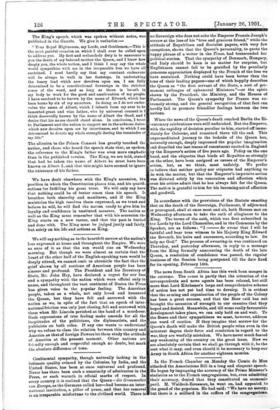The King's speech, which was spoken without notes, was published
in the Gazette. We give it verbatim Your Royal Highnesses, my Lords, and Gentlemen,—This is the most painful occasion on which I shall ever be called upon to address you. My first and melancholy duty is to announce to you the death of my beloved mother the Queen, and I know how deeply you, the whole nation, and I think I may say the whole world sympathise with me in the irreparable loss we have all sustained. I need hardly say that my constant endeavour will be always to walk in her footsteps. In undertaking the heavy load which now devolves upon me, I am fully determined to be a constitutional Sovereign in the strictest sense of the word, and as long as there is breath in my body to work for the good and amelioration of my people. I have resolved to be known by the name of Edward, which has been borne by six of my ancestors. In doing so I do not under- value the name of Albert, which I inherit from my ever to be lamented great and wise father, who by universal consent is I think deservedly known by the name of Albert the Good, and I desire that his name should stand alone. In conclusion, I trust to Parliament and the nation to support me in the arduous duties which now devolve upon me by inheritance, and to which I am determined to devote my whole strength during the remainder of my life."
The allusion to the Prince Consort has greatly touched the nation, and those who heard the speech state that, as spoken, the reference to the King's father was even more emphatic than in the published version. The King, we are told, stated that had he taken the name of Albert he must have been known as Albert I., and that this might have seemed to ignore the existence of his father.


















































 Previous page
Previous page